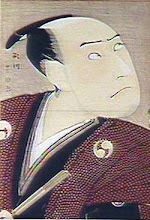Several years ago the community college I was working at began offering a conversational Japanese language class. According to the department secretary the school had a successful Japanese program several years before, but the instructor had quit and they had never been able to replace her. (My own opinion is that the department chair at the time just didn't want to have anything to do with any language that didn't have Latin as a parent.) I had for some time been reading a lot of Japanese fiction, and had often wondered how much the original differed from the translations I was reading. I was also vaguely bored. The upshot of all this was that at the tender age of fifty-seven I enrolled in JPN 115 meeting on Monday and Wednesday evenings.
When friends and co-workers found out what I was doing their reaction was fairly uniform. "Wow, that's great," followed by an awkward pause of a second or two, and then, "Um, why?" Many told me I should take Spanish. It would be much easier than Japanese to learn, and much more useful. They are probably right. The thing is I wasn't looking for usefulness. Anyway, to answer their question I would give them one of three answers. Some were told that I had decided to have a mid-life crisis but was too old and fat, and poor, to attract a young, blond mistress, or buy the roadster of my dreams. Other people were told that I was getting prepared in case the company I worked for ever decided to expand into Japan. And a few people, in a moment of weakness, were told the truth, which was, and still is: I don't really know. (Actually the first two explanations are also true in some strange theoretical way—they're just not very accurate.)
There certainly was a strong desire to read Ibuse's Black Rain and Kawabata's Palm of the Hand Stories, among others, in their true voices. Especially Black Rain. It is such a brutally honest account of the horrors of that day in August, and how it affected the lives of those who survived and continued to cause misery and suffering for years afterward; but there is also an over-riding, gentle optimism that touches me in a very profound way. There are scenes that are extremely moving in English, and even though I would not understand most of the subtleties I would like to experience them in their true voice.
But, perhaps more importantly, there was a real feeling of stagnation in my life, and a need to rattle the bars just a bit. Work, while almost always abusive and often frustrating, was also very routine and held few real challenges aside from the usual campus and corporate machinations. This isn't to say I disliked my job. Oddly enough, when I was allowed to do it with out interference from management and faculty it was quite enjoyable. But there is a very fundamental reason "Dilbert" strikes a nerve in almost every corporate worker in the United States, and it is that we all work for that pointy haired boss, and our Human Resources departments are, for all intents and purposes, run by the evil Catbert. And my old email signature of "Why are campus politics so vicious? Because the stakes are so small." is only funny because it's a fundamental truth.
Anyway, one Monday evening that August I entered the classroom about ten minutes late (one of the ironies of working in a college bookstore was that my management could never understand why I needed time off to take a college course), and began a very rewarding journey. It's been a kind of bumpy journey. I have had to drop out some semesters because of hemorrhages, or having to have a knee joint replaced a couple times, and sometimes work interfered more than it should have; but I have had two excellent instructors that have been patient, understanding, and amazingly enough have actually been able to teach this petrified brain a few things. I think it was possible because, while they are very different personalities, they both care very deeply about their culture, and wish to share the beauty of their language. アンソン晶子先生と豊田茂子先生、どうもありがとうございます。(Professors Akiko Anson and Shigeko Toyota, thank you very much.) I can never really thank you enough.
電気がつくとかえってゆく子供らに水平がある
Electric lights Schoolboys returning home The sea-line beyond.
Subscribe to:
Post Comments (Atom)



No comments:
Post a Comment